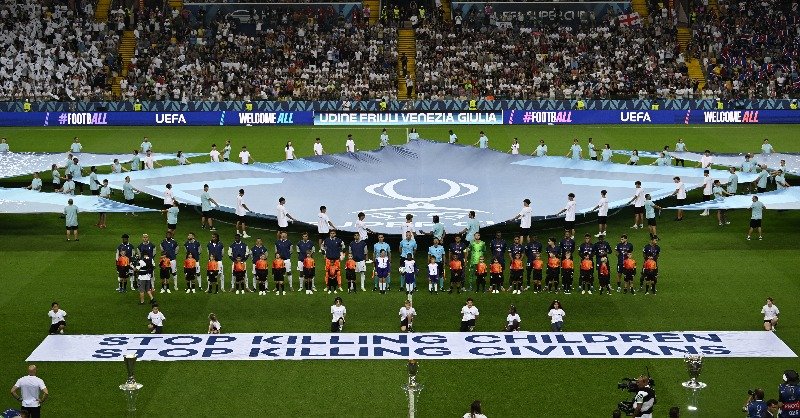In 2022, UEFA made a clear and widely publicized move when it banned Russian clubs and national teams from all European competitions after Russia invaded Ukraine. At that time, UEFA framed its decision as a moral imperative, stating that football could not be disconnected from the suffering of civilians and that the sport must stand with the victims of aggression. Many applauded this action, viewing it as a strong statement in favor of human rights and international law.
However, in 2025, UEFA faces accusations of selective morality. Despite months of conflict in Gaza that have resulted in tens of thousands of Palestinian deaths destruction of civilian infrastructure and serious accusations against Israel from various United Nations bodies and human rights groups UEFA still allows Israeli teams to compete in European competitions. This stark contrast in treatment between Russia and Israel raises serious questions about UEFA’s consistency credibility and commitment to its stated values.
When Russia invaded Ukraine in February 2022 UEFA acted quickly in a joint statement with FIFA it announced an immediate ban on all Russian teams from international and club competitions. UEFA also moved the Champions League final from Saint Petersburg to Paris and cut sponsorship deals with Russian companies. It urged its members to avoid friendlies or joint activities with Russian football organizations.
UEFA justified these actions as a direct response to the humanitarian crisis that followed the invasion. “Football is fully united here and in full solidarity with all the people affected in Ukraine,” the governing body declared. “We hope that the situation in Ukraine will improve significantly and rapidly so that football can once again be a vector for unity and peace among people.”
This was more than just a symbolic gesture. It established a precedent: that participation in large scale military aggression and the resulting human suffering could lead to a country’s exclusion from European football, regardless of how it affects players, clubs, and fans.
In contrast, UEFA’s stance on Israel during its war in Gaza is markedly different. Since October 2023, Israel’s military campaign has faced widespread condemnation from humanitarian groups and legal experts, including accusations of indiscriminate attacks, collective punishment and violations of the Geneva Conventions. The United Nations, Human Rights Watch and Amnesty International have reported significant civilian casualties, including children as well as the destruction of vital infrastructure like hospitals, schools and water systems.
The International Court of Justice has even mandated provisional measures requiring Israel to prevent acts of genocide and ensure that humanitarian aid reaches the population. These are not fringe claims, as they are supported by the world’s leading legal institutions.
Even more alarmingly for the football community, the Palestinian Football Association has reported that over 300 Palestinian footballers, from youth players to national level athletes, have died since the war began. Entire clubs have been devastated. Training grounds, stadiums and sports academies have been reduced to rubble. This is not just collateral damage. it represents the loss of an entire generation of athletes.
Despite this, Israeli football clubs and national teams continue to compete in UEFA tournaments without interruption. Maccabi Haifa, Maccabi Tel Aviv, and the Israeli national team have not faced any bans, sanctions or special conditions. The competitions carry on as if nothing is happening off the pitch, even while Palestinian football is vanishing.
Critics argue that UEFA’s lack of action reveals a blatant double standard. If the reason for Russia’s suspension was that sports organizations must not be complicit in or indifferent to the suffering caused by military actions of member states, then the same reasoning should apply to Israel. The suffering in Gaza is no less severe than that in Ukraine and the accusations of war crimes are equally credible.
Many believe that the difference lies in geopolitics. Israel has strong political and diplomatic support from the European Union and the United States, making punitive action against it much more controversial and potentially costly for UEFA. The governing body may worry about backlash from influential allies, sponsors or media if it imposes sanctions on Israel similar to those on Russia.
This raises questions about UEFA’s credibility. By applying its moral principles selectively it suggests that the value of civilian lives depends on the identity of the perpetrators and their political connections.
Sport has never been separate from politics. FIFA and UEFA have recognized this in many ways, from anti-racism campaigns to their positions on apartheid in South Africa. Football can be a powerful tool for justice, but only if its leaders are willing to apply their rules fairly.
When UEFA acted against Russia, it claimed that protecting the integrity of football meant opposing military aggression and standing with victims. By refusing to act against Israel under similar, if not worse, humanitarian conditions, including the targeted killing of hundreds of footballers, UEFA undermines its own stance. This transcends hypocrisy, it damages the sport’s moral authority and makes future solidarity campaigns seem hollow
Several human rights organizations have criticized UEFA’s position. The Palestinian Football Association has called for Israel’s suspension, pointing to the destruction of Palestinian sports infrastructure and the deaths of athletes. Activist groups across Europe have also protested outside UEFA headquarters and during matches involving Israeli teams, urging the organization to uphold its precedent from 2022.
Even within the football community, there is increasing discomfort. Some players have voiced their concerns on social media, questioning why football supports some victims of war while ignoring others. However, due to the political sensitivity of the issue, many clubs and players remain quiet fearing fines, suspensions or public backlash.
UEFA’s official motto is “We Care About Football.” But if the organization genuinely cares about the integrity and values of the sport, it must understand that selective enforcement damages football’s reputation. The sport’s claim to be a universal language of peace cannot endure if it turns a blind eye to some victims while mourning others.
UEFA faces a clear choice: uphold the principle that war crimes and mass suffering such as the deaths of over 300 footballers have no place in European football, or acknowledge that these principles are negotiable depending on the political context. The former requires courage,the latter risks turning UEFA’s humanitarian stance into nothing more than a public relations exercise.
If UEFA wants to maintain its credibility, it must treat Israel’s actions with the same seriousness it applied to Russia. Anything less is not just inconsistent, it betrays the very values the organization claims to defend
UEFA’s Double Standards: Israel’s Place in European Football Amid Human Rights Concerns




Sorumlulukla kumar oynamak , deneyiminizi korur .
Zaman sınırlarınızı önceden belirlemek , dengeli oynamaya yardımcı olur .
Hesabınızı sınırlandırma araçlarını kullanmak, sorunları engellemenize destek olur .
Alev Online Casino
Oyunların sorunlarının farkında olmak, dengeli katılım sağlar .
Zorlandığınızda profesyonel destek aramak, sorunları artırmaya yardımcı olur.
Bu adımlar , sorunsuz keyifli kumar deneyimi yaşamanızı sağlar .
rotwzphlvmxdjojjnivvqmtvhqogmn